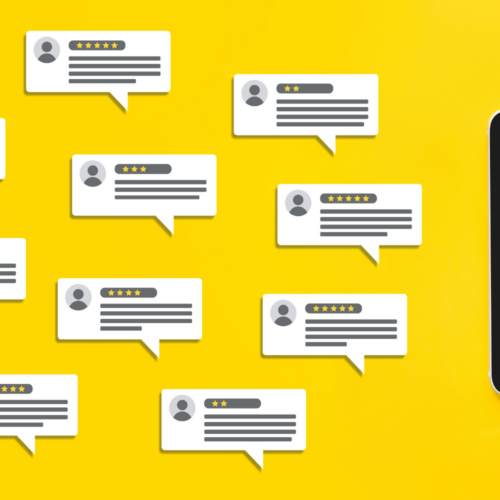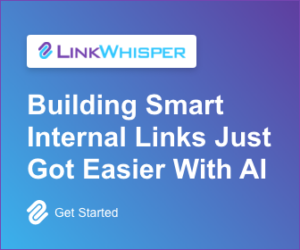How to Start an Amazon FBA Business With Very Little Money!

When you buy something through one of the links on our site, we may earn an affiliate commission.
An Amazon FBA business is a great way to earn some passive income, but you'll have to put in the work upfront. It requires solid research and business acumen to turn a profit. The only catch is that the initial investment can be a bit steep. Instead, you may need to know how to start an Amazon FBA business with little money.
If you are considering diving into entrepreneurship and leveraging your account as an Amazon seller, here is what you need to know to make a profit without breaking the bank.
Contents
- Choosing the Right Type of Seller Account
- Selecting Low-Cost, High-Profit Items
- Choosing Between Arbitrage and Private Label
- How to Manage Inventory on a Budget
- Minimizing Shipping Costs
- Limit Unnecessary Expenses
- Study Powerful Copywriting Skills to List Your Own Products
- Reinvesting in Advertisements
- Final Verdict: Best Ways to Start an Amazon FBA Business on a Budget
Choosing the Right Type of Seller Account
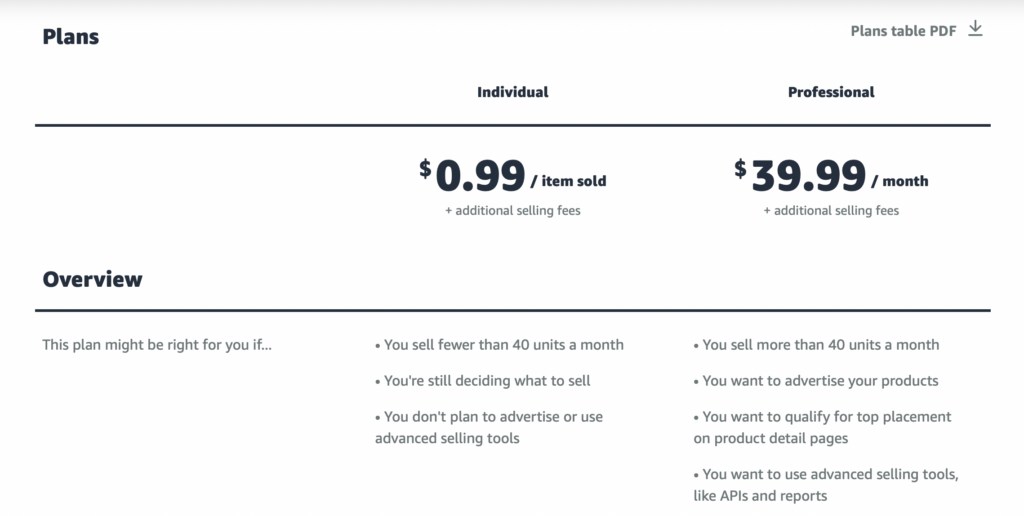
Did you know that 89 percent of Amazon sellers report a profitable business? But the first thing you need to do as an Amazon FBA seller is to select the right type of account.
You have two main options when it comes to your FBA business: a professional account plan or an individual account. Understanding the difference between the two is key and your bottom line dictates which is best for you.
A professional account plan costs $39.99 per month for the right to register as an Amazon FBA seller. This can put a serious dent in your nest egg that you have saved to get your business off the ground.
On the other hand, an individual account on Amazon seller central is completely free.
The catch is that you will pay per item sold. At $0.99 each, this can add up quickly if you're selling lots of items. You will have to factor this cost into the overall price of your product.
Selecting Low-Cost, High-Profit Items
The major expense that you'll have to shell out for is the actual products you want to sell.
Because they must be shipped to Amazon in advance of the sale for order fulfillment, you have to purchase inventory before you can sell anything.
To this end, you need to pick a low-cost item that promises a high-profit when you turn the product around.
How can you make sure that you're selecting the right products?
The first thing you can do is spend some time researching products on Alibaba. You can set up Alibaba to your Amazon FBA account relatively easily.
However, the most important thing you can do is conduct research via a tool like Jungle Scout. This simplifies the research you need to do in order to find products that will really move.
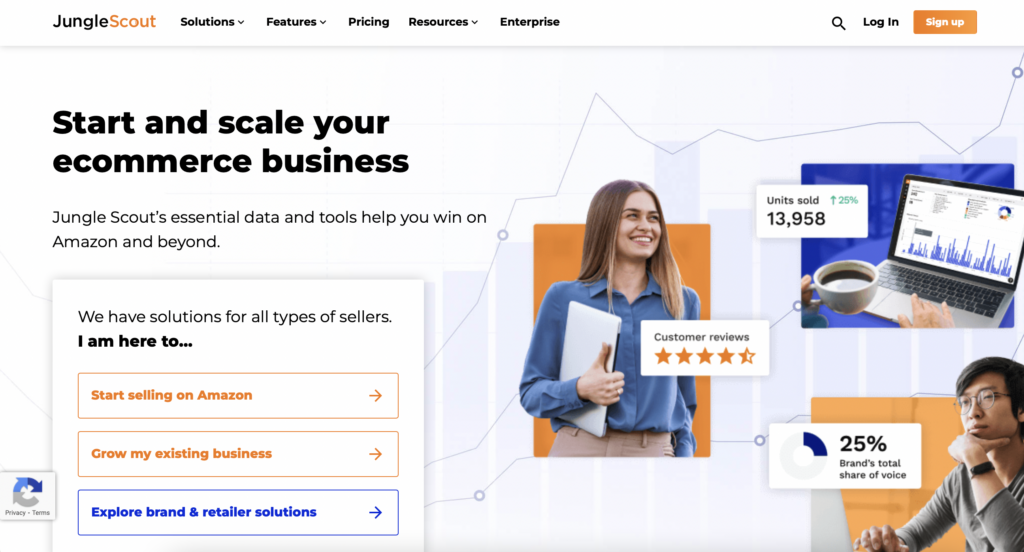
Jungle Scout allows you to look for markets that haven't already been super-saturated. It demonstrates the demand for specific products that you'll want to look at as an FBA seller.
There's no shortage of items on Jungle Scout, with hundreds of thousands of products listed.
You can see the data however it's easiest for you, including grouping items by rating, number of units sold, and more.
For more information, be sure to see our full Jungle Scout review here.
The good news is that 17 percent of Amazon sellers started with $500 or less, so there's hope for you to start an Amazon FBA business with little money!
Choosing Between Arbitrage and Private Label
When you make your FBA business, you'll have to decide between retail arbitrage and private label.
Retail arbitrage is the simple act of buying a product at one price (hopefully a low one) and reselling it for a higher rate to earn a profit.
It requires very little skill and minimal financial investment beyond the purchase of your inventory.
On the other hand, private label allows you to create a brand for yourself and your business.
Private label products require you to implement branding such as a logo, color selection, and even new packaging that aligns with your FBA business.
It's a bit more expensive, so most people who want to start an Amazon FBA business with little money will start with retail arbitrage and build their way up to private label products.
How to Manage Inventory on a Budget
As we discussed earlier, your biggest investment for your Amazon seller account will be your initial inventory.
When purchasing retail arbitrage or private label items, you'll want to inquire about the minimum purchase amount.
You can start your new FBA business with 500 units or less, but you may have to do some negotiating.
Be sure to contact customer service at your supplier to see if you can get a smaller quantity for this first shipment. You may want to invest in just 250 units if you don't have much to spend.
Pro Tip: Only purchase what you feel you can sell on Amazon within the first 90 days, especially if your product is bigger than shoebox-size. This is because they will charge you a storage fee based on the cubic feet that your product occupies in their warehouse.
You'll have to fork over $0.83 per cubic foot during the first nine months of the year and $2.40 per cubic foot for the final three months of the year.
Minimizing Shipping Costs
Chances are that you have already investigated whether you could sell your products on your own, negating the need to send products to the Amazon warehouse.
Because of the time it takes you to organize and package each product, it's usually more cost-efficient to allow Amazon services to take care of it for you.
To keep shipping costs low, look for small products that will cost less to ship. Oversized items will not only take up more room in the warehouse (read: more storage fees), but these bulky packages cost a much heftier shipping fee.
Not sure whether an item would be considered oversized or how much it would cost you to ship? Be sure to look at the Amazon shipping charges when doing your product research on Jungle Scout.
Consider this chart of the Amazon FBA cost for shipping and fulfillment:
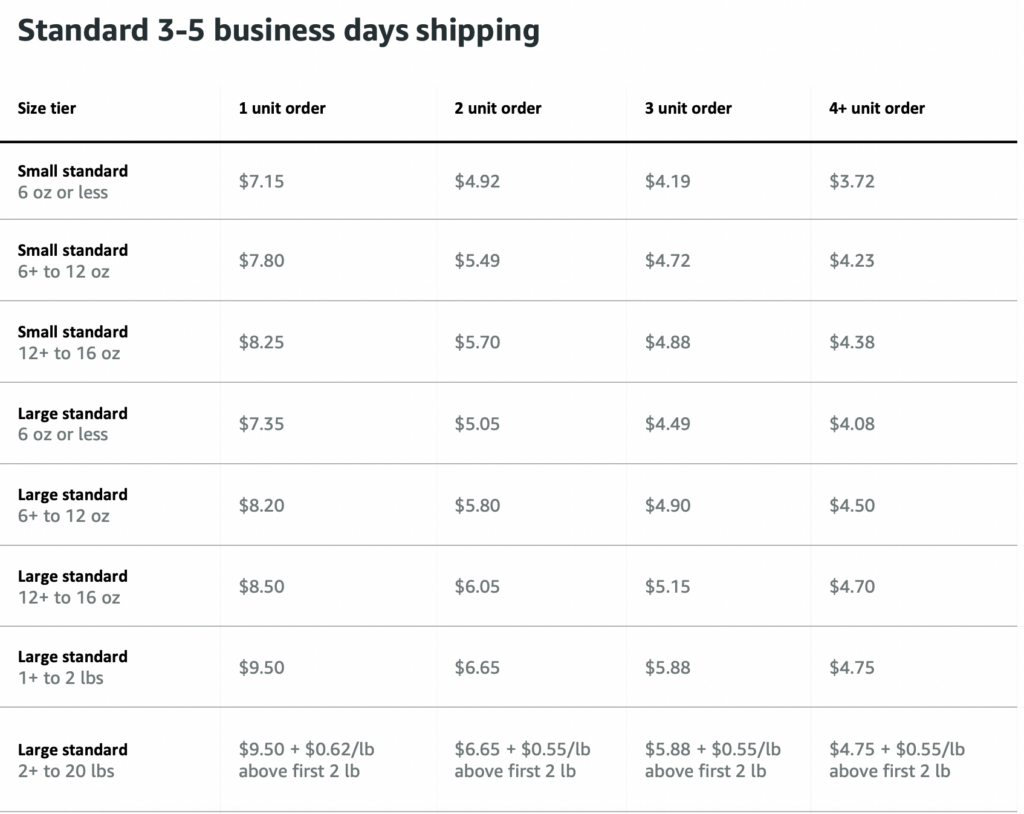
Make sure you account for the fees that you will be charged as an FBA seller when setting your price and choosing the perfect product!
Limit Unnecessary Expenses
When it to starting any business, you want to keep your overhead as low as possible.
There are lots of things you could invest in when it comes time to start an Amazon FBA business with little money, but are they really necessary?
Most of these expenses come into play if you're planning to private label, which can be avoided by initially transitioning to a retail arbitrage model.
You can keep out-of-pocket costs low by avoiding paying for your company branding, including a logo or special packaging.
Even if you do decide to sell private label products, you might want to consider allowing them to ship with little to no indication of your brand.
There is always time to grow brand awareness at a later date when you have a little more money to reinvest from the sales in your new Amazon business.
For right now, keep your focus on solid product research and finding items with high profit margins that will allow for some of these investments at some point in the future.
Focus on how you can simply list your item with your brand name in the Amazon marketplace, even if it doesn't ship with a sleek new logo.
Study Powerful Copywriting Skills to List Your Own Products
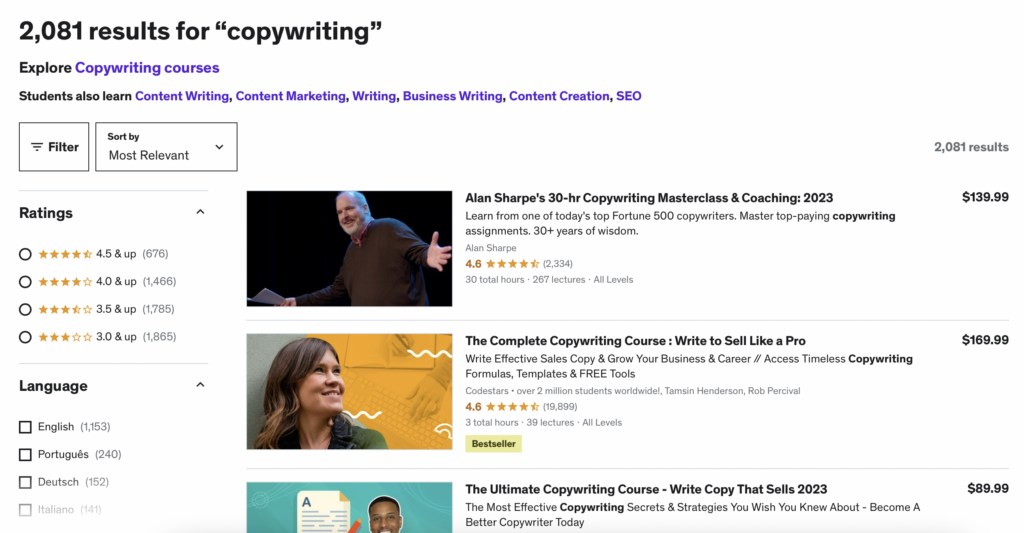
How do you make sure that your products stand out from everything else in the vast Amazon marketplace? Product research is only the first step to get you where you need to go.
Some people choose to hire professional copywriters to make sure that their product stands out from the competition.
However, this can be another one of the unnecessary expenses that boost your initial investment beyond what you might want if you plan to start an Amazon FBA business with little money.
Instead, you should consider enrolling in some copywriting courses that will teach you how to tap into your inner-writer to make your products sound appealing. The best way to land on a best seller is to make sure that your product descriptions are clear, concise, and compelling.
If you need a little help with your copywriting skills, we have a few articles that might be able to help you:
- 9 Top Copywriting Generator Tools to Help Scale Your Sales Copy
- Best Copywriting Books: 20 Books Every Copywriter and Entrepreneur Needs to Own
- What is Creative Copywriting? And What are 5 Skills You Should Learn for Success?
- 11 Best Copywriting Podcasts that Can Actually Improve Your Writing
Once you exhaust some of these free resources, you may consider enrolling in an online course to bolster your writing skills. Sites like Udemy and Coursera have a ton of courses to choose from, often at a discounted rate.
They're easy to manage and can make diving into the world of copywriting feel a bit more manageable so that you can focus on finding a best seller.
Reinvesting in Advertisements
Last but not least, you should really consider what to do with your profits after you sell your first batch of products.
Once you pay out your Amazon FBA fees, you might be tempted to pocket the extra earnings for all the hard work you put into the business – but not so fast!
The best thing to do is to reinvest some (ideally, all) of those earnings back into your growing business.
Amazon PPC ads can be an excellent way to gain more visibility. The more eyes you have on your products, the more likely you are to sell more.
These are a great investment because it boosts your item to the top of the SERPs on the Amazon marketplace. Plus, you only get charged if a customer actually clicks on your products.
If you spent time refining your copywriting skills, this should make closing the deal a breeze.
If you find that people are clicking on your ads but aren't purchasing, you might need to go back to the drawing board with your product description, pricing, or listing name.
If you still have some money left over after an Amazon PPC campaign, then you might want to go back to the drawing board with product research.
You should have enough money left over to purchase inventory of new items or to boost your inventory of your current Amazon business.
Final Verdict: Best Ways to Start an Amazon FBA Business on a Budget
Starting a business of any kind requires a little bit of an initial investment. Some people spend thousands to start an Amazon FBA business, but it could be easier than you think.
You can land on a best seller with a little planning and attention to detail. In turn, you will earn plenty of money to reinvest and scale your new storefront.
Of course, the most important thing you can do is conduct thorough product research with a tool like Jungle Scout. Try Jungle Scout here to start finding the best products that will work for your new store.
Want to learn step-by-step how I built my Niche Site Empire up to a full-time income?
Yes! I Love to Learn
Learn How I Built My Niche Site Empire to a Full-time Income
- How to Pick the Right Keywords at the START, and avoid the losers
- How to Scale and Outsource 90% of the Work, Allowing Your Empire to GROW Without You
- How to Build a Site That Gets REAL TRAFFIC FROM GOOGLE (every. single. day.)
- Subscribe to the Niche Pursuits Newsletter delivered with value 3X per week
My top recommendations
